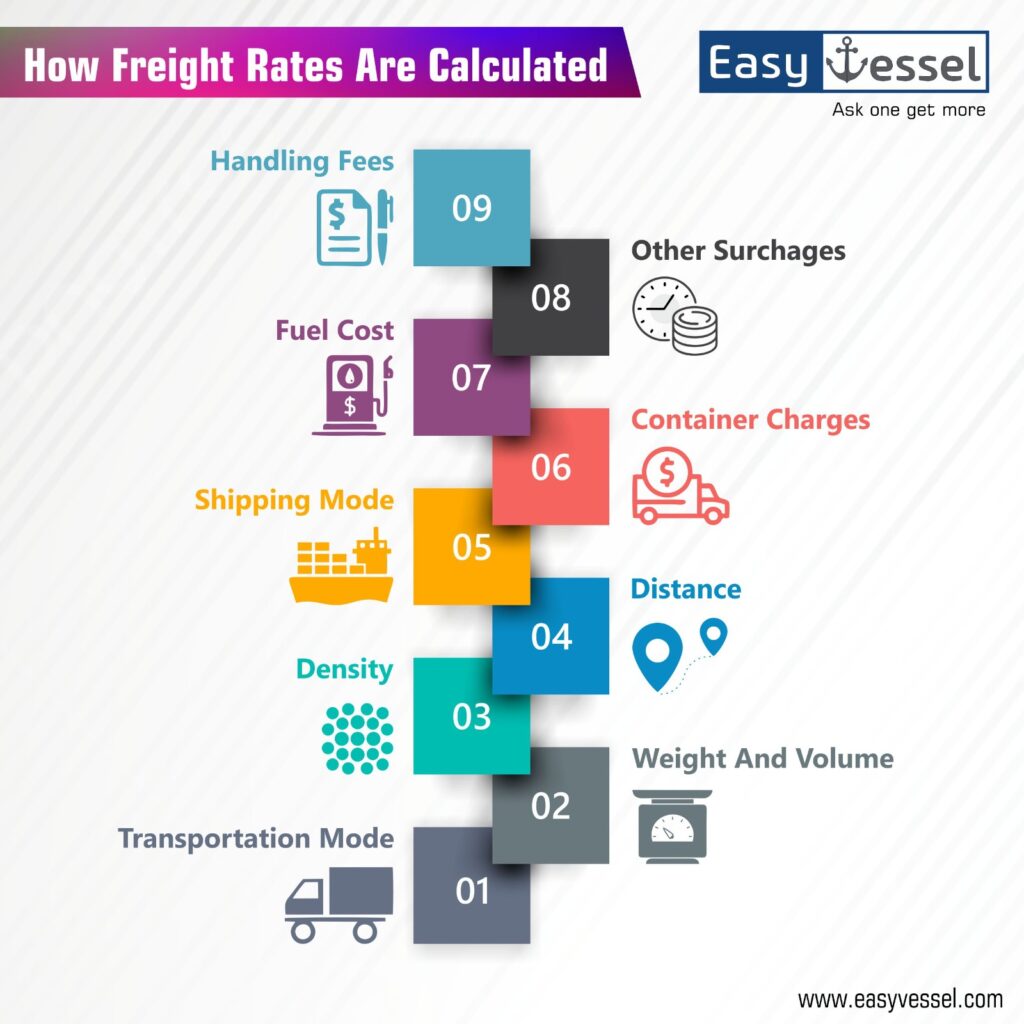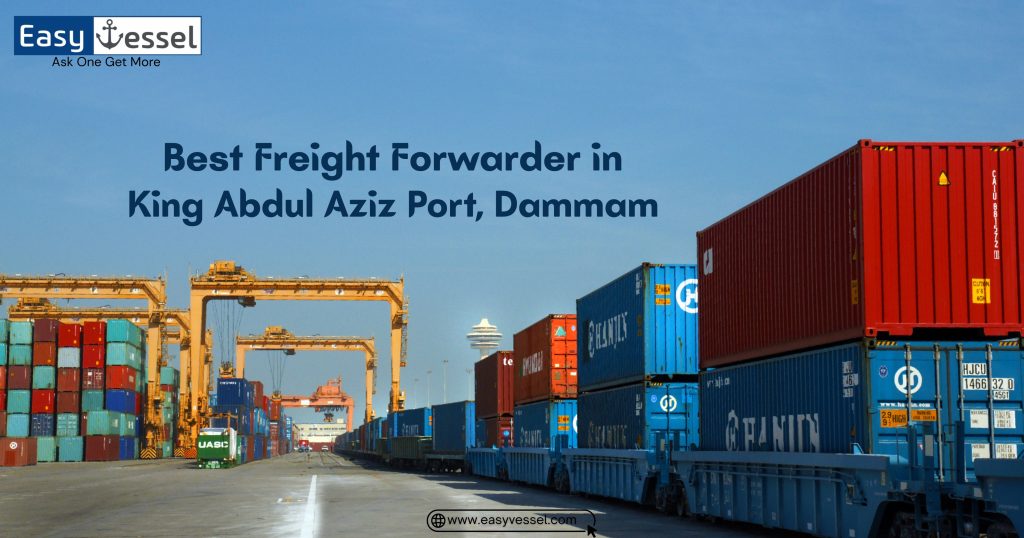Introduction
- Calculating freight rates is a crucial aspect of logistics management when shipping goods from one place to another.
- Freight rates determine the cost of transporting cargo and play a significant role in supply chain expenses.
- Whether you are a business owner, a logistics professional, or someone interested in understanding the freight industry, this comprehensive guide will walk you through the factors involved.
- Use the formulas and some valuable tips to calculate freight rates effectively.
What is the freight rate?
Freight rate, also called shipping rate or freight charge, is the cost you pay for transporting goods from one place to another.
Shipping carriers receive monetary compensation for their services in moving cargo, and various factors can influence the amount they pa
id.
Affecting Factors:
Distance:
- The distance between the origin and destination points is a fundamental factor in the freight rate calculation.
- Longer distances typically result in higher shipping costs.
Weight and Volume:
- The weight and volume of the cargo play an essential role in determining freight rates.
- Heavier shipments require more space and handling, leading to increased costs.
Mode of Transportation:
- The chosen mode of transportation, whether it’s trucking, air freight, ocean freight, or rail, has a substantial impact on freight rates.
- Each mode comes with its unique cost structure and transit times.
Type of Cargo:
- The nature of the cargo being shipped affects the freight rate.
- Certain goods may require specialized handling or have specific regulations, contributing to the overall cost.
Additional Services:
- Optional services like insurance, customs clearance, warehousing, and expedited delivery can add to the total freight charges.
Market Demand and Fuel Prices:
- Fluctuations in fuel prices and market demand for shipping services can lead to variations in freight rates.
The Freight Rate Formula:
While calculating freight rates may vary based on different carriers and specific factors, a commonly used formula is as follows:
Freight Rate = Base Rate + (Distance Surcharge) + (Weight/Volume Surcharge) + (Additional Charges) – (Discounts)
- Each element in the formula corresponds to a specific aspect of the shipment and its associated cost.
- The base rate is the standard charge for a particular shipment, and distance and weight/volume surcharges adjust the rates based on the shipment’s characteristics.
- Additional charges account for any more services requested, while discounts can applied for various reasons, such as frequent shipping or seasonal promotions.

How to Calculate Freight Rates:
- Calculating freight rates involves considering various factors, such as the mode of transport, weight or volume of the cargo, distance, and any additional fees or surcharges.
- Here’s a simplified how freight rates can be calculated for three common scenarios: road freight, air freight, and sea freight.
|
Factor |
Road Freight |
Air Freight |
Sea Freight |
|
Mode of Transport |
Trucks or Lorries |
Cargo planes |
Cargo ships |
|
Unit of Calculation |
Per Kilometer (KM) or Per Mile |
Per Kilogram (KG) or Pound (LB) |
Per Container (TEU or FEU) |
|
Volume Calculation |
– |
Per Cubic Meter (CBM) |
– |
|
Weight Calculation |
Per Kilogram (KG) or Pound (LB) |
Per Kilogram (KG) or Pound (LB) |
– |
|
Distance |
Total distance traveled |
– |
– |
|
Container Size |
– |
– |
Twenty-foot (TEU) or Forty-foot (FEU) |
|
Fuel Surcharge |
May apply based on fuel prices |
Based on fuel prices |
Apply based on fuel prices |
|
Other Surcharges |
– |
– |
– |
|
Handling Fees |
– |
– |
– |
|
Total Freight Rate |
Total distance * Rate per kilometer/mile |
Total weight * Rate per kilogram/pound + Fuel surcharge and other fees |
Rate per container + Other surcharges |
Please note that the actual calculation might involve more specific details and factors depending on the shipping company, region, and the type of cargo being transported.
Tips for Accurate Freight Rate Calculations:
Gather Precise Information: Ensure you have accurate details about the cargo, including weight, dimensions, type, and value, to obtain the most precise freight rate calculations.
Evaluate Transportation Modes: Assess different transportation options to select the most cost-effective and efficient mode for your specific shipment.
Negotiate with Carriers: Cultivate strong relationships with shipping carriers and negotiate for competitive rates, especially for regular or bulk shipments.
Consider Consolidation: Whenever possible, consolidate multiple smaller shipments into larger ones to take advantage of volume discounts.
Understand Incoterms: Familiarise yourself with Incoterms, as they define the responsibilities of buyers and sellers in international trade, impacting freight costs.
Stay Updated with Market Trends: Keep a close eye on market trends, such as fuel prices and demand fluctuations, to adjust your shipping strategies proactively.
Conclusion:
Freight rate calculation is a crucial aspect of logistics management, impacting shipping costs and overall supply chain efficiency.
With accurate, companies can streamline their logistics operations, enhance customer satisfaction, and ultimately achieve a competitive advantage in the dynamic world of global trade.
If you are shipping goods internationally, it is a good idea to use a freight forwarder. They can help you save time, money, and hassle. so, visit easyvessel to get more benefits.
References:
Freight rate By Wikipedia [1].
FAQ’s:
Freight Rate Formula: Freight Rate = Base Rate + (Distance Surcharge) + (Weight/Volume Surcharge) + (Additional Charges) – (Discounts)
To calculate freight charges per kilogram (kg), you need to consider the total weight of the cargo being shipped and the applicable rate per kilogram. The formula for calculating freight charges per kg is straightforward:
Freight Charges per KG = Total Weight of Cargo (in KG) * Rate per KG
For example, if the total weight of your cargo is 500 kg and the rate per kg is $2.50, the calculation would be:
Freight Charges = 500 kg * $2.50/kg = $1250
So, the freight charges for the shipment would be $1250.
The factors that affect freight rates include:
The weight and dimensions of the shipment
The distance the shipments need to travel
The type of transportation used
The current market conditions
The type of goods being shipped
The time of year
The carrier’s operating costs




